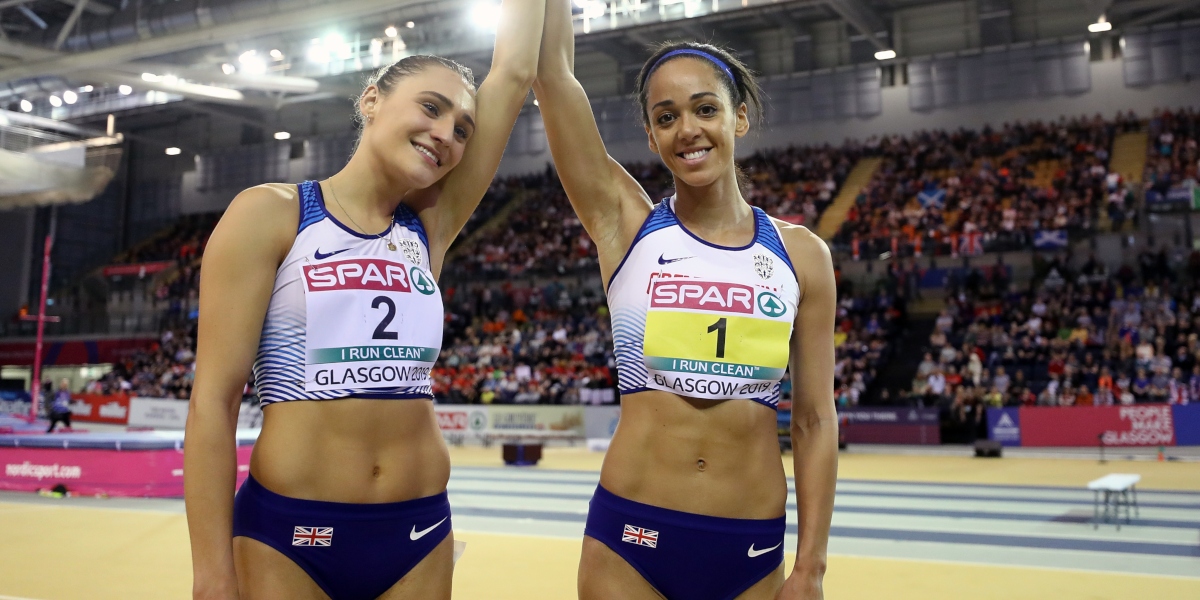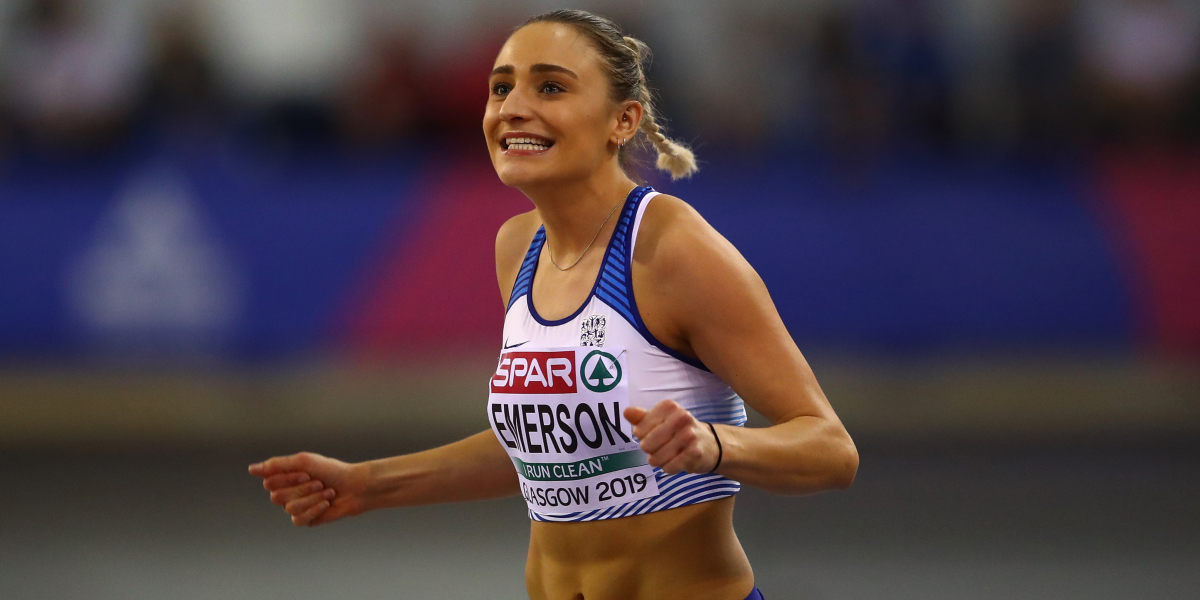
22nd July 2020
FAMOUS FLASHBACKS - EUROPEAN INDOOR CHAMPIONSHIPS 1-2S
We continue our look back at times when British athletes, past and present, have made the headlines by achieving a 1-2 at a major championship, this time putting particular focus on the European Indoor Championships. Indoors, British athletes have thrived at this competition, sitting fourth on the all-time championship medal table, behind the now defunct West Germany, East Germany and the Soviet Union.
Here, we focus on the times when the British athletes locked out the top two spots on the podium with some polished performances, well-timed charges and dominant displays against the best that the continent had to offer.
KJT and Emerson run riot in Glasgow
Last year in Glasgow, there were only two names on everybody’s lips in the pentathlon as Katarina Johnson-Thompson (Bertrand Valcin; Liverpool) and Niamh Emerson (David Feeney; Amber Valley & Erewash) competed at a major championships with the vocal backing of a home crowd.
The duo arrived in Glasgow off the back of strong 2018 seasons that had seen Johnson-Thompson claim the World Indoor Championship title in Birmingham, adding Commonwealth gold and European heptathlon silver also, while Emerson had set a world junior leading mark as she claimed World U20 Championship gold in Tampere, along with Commonwealth bronze.
Both were looking to claim more silverware to add to their collection and become the first athletes since 1992 to claim a 1-2, when Romania’s Lilliana Nastase and Petra Vaideanu locked out the top two spots on the podium.
Johnson-Thompson had won this competition back in 2015 in Prague, where she amassed a British record of 5000 pts over the five events, winning by more than 300 points from closest rival, Belgium’s Nafi Thiam.
Johnson-Thompson wasted no time in outlining her plans for reclaiming the title, matching her 60m hurdles season’s best of 8.27s as she finished second to Solene Ndama (FRA) in the first heat, the Frenchwoman setting a championship best of 8.09s.
In the second heat, it was Emerson who showed her continuing improvement with a personal best 8.54s, crossing the line third and scoring 1008 points, with Johnson-Thompson sat second after the first event on 1068 points.

The high jump saw the duo shine, taking the top two places in the event. Emerson cleared an indoor personal best of 1.87m for another 1000-plus point haul, while Johnson-Thompson went one better, setting the championship best with a first-time clearance at 1.96m, opening up a 159 point lead on Latvia’s Laura Ikauniece, with Emerson third on 2075 points.
In the shot put, both posted lifetime improvements to ensure they stayed in the top three. Emerson took seventh position in the event standings courtesy of a 13.93m effort, improving 33cm on her previous best from January, while Johnson-Thompson added a centimetre to her own lifetime best with a 13.15m effort, maintaining her lead at the top by 118 points.
As the evening session resumed, the long jump saw the duo continue their dominance from earlier in the morning. It was the Liverpudlian who secured her second event win of the championship with a 6.53m second round attempt, while it was yet another personal best for Emerson, this time saving her best for last, notching a huge indoor PB of 6.29m and moving into silver medal position by 10 points.

For the final event, the task for Johnson-Thompson was easy, win and the title was hers, while Emerson had to ensure she finished ahead of Ikauniece, Ndama and Dadic to make sure of silver, otherwise it would all go down to the calculations that come with the final event.
There were no worries for KJT as she produced a measured display for the gold, winning in 2:09.13 and setting a world leading mark of 4983 points in the process. For Emerson, the silver medal looked in her sights, until the final bend when she began tiring, with Ndama and Dadic right on her shoulder.
The duo passed the Briton with a matter of metres to go as Emerson fell across the line and was made to wait for confirmation of her final position. Eventually, the score of 4731 was read out and the crowd at the Emirates Arena erupted as she made it a British 1-2 and ensured she had a personal best.
Shakes-Drayton and Child reign supreme in Gothenburg
In Sweden in 2013, 400m hurdles stars Perri Shakes-Drayton and Eilidh Child showed they were just as adept on the flat as they were over the barriers as they swept the 400m in Sweden.
Great Britain & Northern Ireland arrived with a chance to lock out the podium in the event, with Shana Cox, the world indoor 4x400m gold medallist from Istanbul, also present and bidding for a first individual medal representing Great Britain in her career.
Child, the 400m hurdles Olympic semi-finalist, had the chance to claim her first continental indoor medal of her senior career and her first in a British vest since the 2009 European Under-23 Championships, where she brought home silver, behind Shakes-Drayton in the 400m hurdles.
Shakes-Drayton, who also formed part of the 4x400m gold medal winning quartet in Turkey, boasted individual 400m hurdles bronze and 4x400m silver from the European Championships of 2010, and her indoor preparation had been good, despite being absent at the trials, she took second spot in the Birmingham Indoor Grand Prix behind Natasha Hastings (USA).
Shakes-Drayton set the tone for what was to come in the first of three heats, bursting out of lane six and ensuring the most comfortable of victories, stopping the clock in 51.70s, more than a second clear of runner-up, Moa Hjelmer of Sweden.
Cox booked her place in the semi-finals as one of the fastest non-automatic qualifiers, coming home third in the second heat in 52.99s, while Child responded to Shakes-Drayton’s earlier efforts, winning the third and final heat in 52.05s, the second-fastest time behind her teammate.
With no fastest-loser spots up for grabs in the semi-finals, there was no room for error and Child ensured safe passage with a controlled 52.29s victory in head one as Cox scraped through in third, clocking 52.86s.
But anything they could do, it seemed Shakes-Drayton could do better as she set the European leading mark of 51.03s to win her heat and make it a trio of British athletes in the final.
The final was where Shakes-Drayton backed up her European leading time with a world lead and the gold medal, dominating from start to finish. At the bell, she opened up a small gap to Child, with Cox fighting well from lane one to move up into third position.
As Cox began to tire and lose ground on her teammates, they seemed to get quicker and quicker, with Shakes-Drayton motoring away down the home straight for the title in 50.85s, with Child having to settle for silver in 51.45s, securing a personal best of her own.
The trio would combine with Christine Ohuruogu to form the 4x400m relay team and break the British and Championship record in 3:27.56 as they added yet another gold medal to the British tally.

Double Delight in Birmingham for British quartet
A first ever European Indoor Championship 1-2 in the field for Great Britain & Northern Ireland came back in 2007, as Commonwealth Games triple jump champion Phillips Idowu and European silver medallist Nathan Douglas.
Qualifying on the opening day went well for the duo. With Idowu requiring just the one jump to make it through into the final, sailing out to 16.82m, just nine centimetres short of the 16.90m auto-qualifying mark.
Douglas on the other hand was made to sweat. A first round foul and a second round 16.46m had him uncertain of his future in the competition, with four jumpers circling around his mark and keen to knock him out. But the Oxford man held his nerve and became the only man to guarantee automatic qualification with a massive 16.96m on his final attempt.
In the next day’s final, Idowu once again signalled his intent from the off, a huge first-round season’s best of 17.56m effort put him in a commanding lead, with Douglas second with a 17.08m first round attempt. Douglas backed up his first effort with a 17.22m leap in round two, before moving within seven centimetres of the gold in round three, with a huge 17.47m, a new personal best.
Idowu struggled to match his monstrous first jump, with Douglas producing another 17.00m plus jump in round five, but he was not troubled by Russia’s Aleksandr Sergeyev and ensured Britain had their first ever 1-2 in an indoor field event.
On the track, defending European Indoor 60m champion made it four straight championship wins in the event as he claimed yet another medal in the British kit.
Gardener was flanked by fellow British teammates Ryan Scott and Craig Pickering in his efforts to make it four consecutive 60m titles.
From the off, the British dominance was clear. Pickering blasted through to the semi-finals, winning heat one in 6.61s from Ireland’s Paul Hession, who broke the Irish national record in exactly the same time, while Scott took second place in his heat, clocking 6.67s.
Gardener once again eclipsed the whole field in the third heat, powering home in 6.59s and giving himself an ideal lane draw for the semi-finals, where he once again went quicker, this time a 6.58s performance earned him the big Q, with Scott booking his place in the last eight in third in 6.63s.
Pickering, the World Youth Championship 100m bronze medallist in 2003, showed Gardener that another gold medal was not a foregone conclusion, matching his time as he won the second heat, with the aforementioned duo qualifying fastest for the final.
With the pressure of a home crowd and the eyes of the world watching, there was heartbreak for Scott as he was disqualified from lane seven for a false start. When the final did get underway, it was all about Gardener as he founded yet another gear to make it an unprecedented fourth European indoor title in a row.
Pickering held on to take silver in 6.59s his first senior medal representing the British team and give Great Britain & Northern Ireland a second 1-2 in the 60m on the continental stage, matching Mark Lewis-Francis’ feat in 2002, where he finished runner-up to Gardener.
The other notable mentions
Gardener’s first 1-2 for the British team came back in 2002, again in the 60m at the European Indoor Championships, this time in Austria, where he was flanked by up and coming Briton, Mark Lewis-Francis.
The latter qualified fastest for the semi-finals with a 6.57s showing to Gardener’s 6.61s, that placed him third in the overall standings, but Gardener turned the tables in the semi-finals, qualifying fastest in 6.55s to Lewis-Francis’ 6.60s.
In the final, it was all about Gardener as he matched the Championship record with a staggering 6.49s effort to take the gold, while Lewis-Francis had to settle for silver in 6.55s.
The first ever British 1-2 indoors unbelievably came in 1989, some 19 years after the competition was first introduced, when Ade Mafe held off John Regis to win the men’s 200m title.
Both finished their heats in second position, Mafe qualifying second fastest in 21.09s with Regis fifth in 21.20s, and measured their semi-final charges to progress second and third fastest again, Regis leading the way in 21.05s to Mafe’s 21.14s.
In the final, it was all about Mafe as he stormed the field to win in 20.92s, improving on his silver from 1984, with Regis’ 21.00s clocking earning him silver. The tables would turn a month later at the World Indoor Championships, where Regis emerged victorious in what has to date been Britain’s only 1-2 at the World Indoor Championships.



